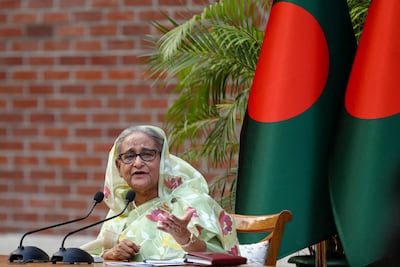Bangladesh has imposed a nationwide curfew and sent troops into the streets to curb widespread street protests by students over jobs, following the deadliest day of violence that left 66 people dead.
Nearly 105 people, mostly student protesters, have been killed in clashes with police this week as street demonstrations that began in June continue.
“The government has decided to impose a curfew and deploy the military in aid of the civilian authorities,” Prime Minister Sheikh Hasina's press secretary Nayeemul Islam Khan said on Friday, according to news agency AFP. The curfew would take immediate effect, he added.
Thousands of university and college students have hit the streets to demand the scrapping of a quota system for highly sought-after government jobs.
At least 52 people were killed in the capital on Friday, according to a list drawn up by the Dhaka Medical College Hospital, AFP reported, which said police fire was the cause of more than half of the deaths reported so far this week.

Students stormed a jail in Narsingdi district in central Bangladesh and freed hundreds of inmates before setting it on fire on Friday.
Police had banned all public gatherings on Thursday and put a nationwide internet shutdown into effect to quell the protests, but confrontations continued, particularly in the capital, Dhaka.
“We've banned all rallies, processions, and public gatherings in Dhaka today,” police chief Habibur Rahman said, adding the move was necessary to ensure public safety.
Thousands of protesters stormed the premises of state broadcaster Bangladesh Television BTV and set fire to the building on Thursday.
The Associated Press reported that border guard officials shot with rifles and sound grenades while police fired rubber bullets and tear gas at more than 1,000 protesters who had gathered outside the head office of BTV.
Bullets littered the streets, which were also marked by smears of blood, AP said.
A near-total internet disruption was in effect in Dhaka, with phone lines also down on Friday.
Websites for the Bangladesh Home and Foreign Ministry, as well as newspapers such as the country’s largest daily Dhaka Tribune and Daily Star, were also not available, as seen by The National.
The official websites of the central bank, the prime minister's office, and the police appeared to have been hacked by a group calling itself “THE R3SISTANC3".
The website of Ms Hasina’s office showed a message that read, “Stop Killing Students,” and then, in blood-red capital letters: “It’s not a protest any more. It’s a war now.”
Indian media reports said about 300 students had returned home after fleeing violence, with several hundred still stranded in the violence-wracked nation.
New Delhi also suspended train services between Kolkata and Dhaka in view of the raging violence.
Tens of thousands of students across Bangladesh have been staging demonstrations for weeks against civil service job quotas for specific groups, including children of veterans from the country's 1971 war of independence from Pakistan.
The protests began in June after the Bangladesh High Court reinstated a quota system that was first brought in 1972 by Sheikh Mujibur Rahman, who led his country’s fight for independence from Pakistan in 1971.
Thousands of fighters were killed in the war.
The system was scrapped by Ms Hasina’s government in 2018 following students’ protest.

The latest protests quickly spread to other universities across the country and turned violent when demonstrators clashed with the student wing of Ms Hasina’s ruling party.
Students argue that the reservation of 30 per cent of the highly sought-after jobs for relatives of veterans is discriminatory and have demanded it to be based on merit.
The country’s Supreme Court suspended the high court order and will hear the government’s challenge on August 7.
Critics said the reservation benefits children of pro-government groups that back Ms Hasina, 76, who has ruled the country since 2009 and won her fifth consecutive term in January after a vote without genuine opposition.
She appeared on a local television channel on Wednesday night, appealing for calm after days of violent protests.
Ms Hasina condemned protesters' deaths as “murder” and that her government agreed with students’ demands but was unsuccessful in calming protesting students who are demanding a legal amendment against the quotas.
The country’s main opposition, the Bangladesh Nationalist Party (BNP) has backed the protesters and vowed to organise its own demonstrations. Many of their supporters have joined in the students' demonstrations.
On Friday, police fired tear gas at a few hundred BNP supporters, and arrested senior BNP leader Ruhul Kabir Rizvi, Reuters reported.

While Ms Hasina has been largely credited for turning the country’s economy around and has worked on reducing poverty, critics and political rivals have accused the leader of authoritarianism, human rights breaches, clampdowns on free speech, and suppression of dissent.
Bangladesh, once considered a poor country, has reported economic growth at an average of 6.25 per cent annually over the last two decades. Its GDP growth has surpassed that of neighbouring India.
Its poverty rates declined from 11.8 per cent in 2010 to 5 per cent in 2022 based on the international poverty line of $2.15 a day, according to the World Bank.
But the country has a persisting job crisis. About 40 per cent youth in Bangladesh are neither working nor studying at universities, according to the Bangladesh Bureau of Statistics.

